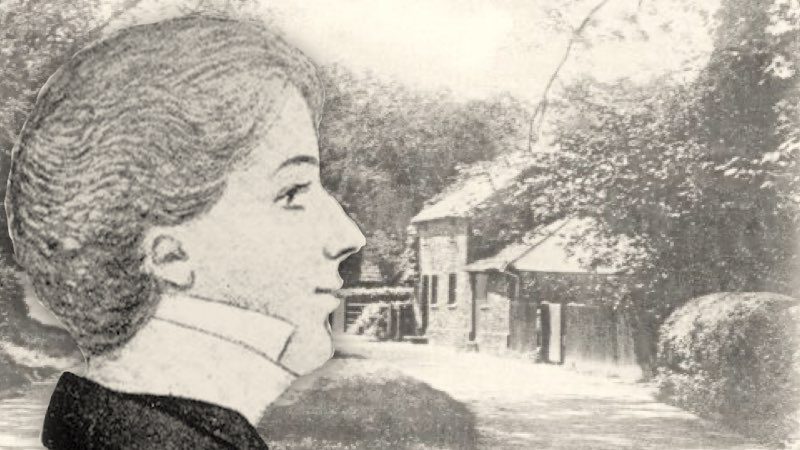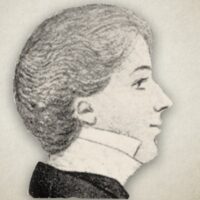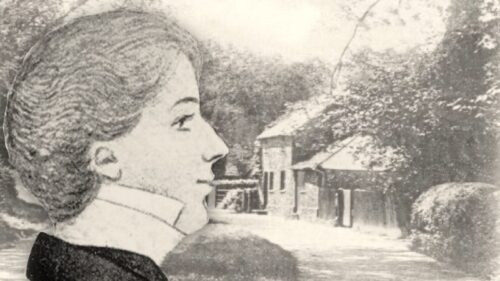
The Pearl Of Great Price
March 14th, 1831
My dear Brother,
I feel much obliged to you for your last letter, and am rejoiced to find that you are desirous of knowing more of Christ. You have much to contend with in various ways from the world, the flesh, and the devil. Satan is a very subtle enemy, and never spreads his snare in your sight. I hope you will not be induced to value any knowledge which does not cause you to love Christ more, and to live more decidedly as a member of His kingdom. Satan does not care how much knowledge you have in your head, so long as he can keep possession of the citadel of your heart. Consequently, he will change his position a thousand times, before he will surrender his hold. But God’s grace must and will dethrone him, and set up the kingdom of Christ in your heart, so that you will serve a new Master, and for very different wages. All that Satan can boast of, or tempt us with, are perishable things of time, that will soon vanish away. But though we profess to despise the riches and honors of this life, none but those who have the light of God’s countenance shining upon them will view them in their proper light. Satan is the god of this world, and he blinds the minds of those who believe not. If one device will not succeed, he will try another; and every unregenerate man will be led captive by him, in some way or other. Many may think they have outwitted him by a knowledge of great truths in the head, while their heart is devoid of grace.
You may, perhaps, think these remarks may not be profitable to you; but I believe we think and speak a great deal too seldom of the greatest of all enemies, and I feel this is his most subtle device. Old disciples of Christ can say, “We are not ignorant of his devices.” But young converts will be entangled, more or less. Consequently, it becomes ministers of Christ to show forth particularly what little they may know of them, so that the word of God “may be a lamp unto our feet, and a light unto our paths.” Though we are not of his kingdom, we live in his kingdom; and we must pass through it to our eternal rest. We must, therefore, watch and pray that we enter not into temptation. You will find “take heed” very frequently in the Bible, and as such words are there we may be sure they are necessary. “Exhort one another while it is called To-day”; “Take heed, lest your heart be hardened through the deceitfulness of sin.” Now, no Christian will grow in grace who has not a single eye to God’s glory; for if the eye be not single, the body is full of darkness.
It matters little what a man knows, if Christ be not to him the pearl of great price. Is Jesus Christ precious to you? Do you love Him so that you would die for Him? Do you count all you lose for His sake gain? Are you willing to make great sacrifices sooner than deny Him? Untried faith is uncertain faith. When you are cast out, and have many trials and difficulties to contend with, you will rejoice, I trust, that you are counted not only worthy to believe in Him, but also to suffer for His sake.
You will not be persecuted for holding gospel truths in the head, but for having grace in your heart; for the former will not cause you to differ from the world. When the fruits of the Spirit manifest themselves in your life; when you are blind to your own interest in this world; when you are deaf to the advice of the worldly-wise, then it will be said of you, “He is a changed man; he is a fool!” Now, my dear brother, be assured of this, as God works in your dark soul, such changes as these will be caused; so that instead of panting after the riches of this world, you will pant after the unsearchable riches of Christ.
‘Human nature’ cannot and will not make great sacrifices; but as you have a knowledge given to you by the Spirit of the exceeding great and precious promises laid up in Christ for God’s chosen few, you will be led to see the nothingness and vanity of all things here below, and you will with joy cry out, “We have a kingdom which cannot be moved!” God, by His Spirit, quickens, and He alone can enable you to separate from your old companions and the world, and so make great sacrifices for Christ’s sake, who has died that you might live; who became poor that you through His poverty might be made rich. Your conscience will become more tender, and you will be better able to discern between good and evil.
At this present time my conscience is not very easy about the Church Establishment. I neither like the system, nor the forms and ceremonies, particularly the baptismal service and catechism. God forbid that my conscience should be hardened through a strong inclination of the flesh to cleave to its respectability and riches. I am not fully satisfied what I shall do; but I pray that God may guide me, and that I may not take such an important step hastily and unadvisedly.
You will, perhaps, be surprised to hear these objections against an Establishment which is admired so much by the world at large, especially by the rich and great. I was perfectly satisfied with it, until the Lord was pleased to open my eyes to discern its inconsistencies. A letter would not, if entirely on the subject, afford me room to say all I could say.
In the baptismal service we thank God for ‘regenerating children’, and then put on the black gown, go into the pulpit, and tell them in plain terms that they were not born again. Our Liturgy makes every baptized person a member of the true Church, and we have to address them as such, when we know to the contrary by their fruits. And the catechism is so full of errors that I am sure no one with a glimmering of spiritual light will teach it to children.
Philpot is still with me, and a very sincere Christian he is; he will leave shortly. He thinks about leaving the Church, though he would give up his Fellowship, and would not be worth a groat. Would not the world call him a great fool? You and I have much to learn. We are very carnal and worldly-minded; we have but little grace. What have we sacrificed for Christ?
Yours in the bonds of the everlasting gospel,
W. Tiptaft
William Tiptaft (1803-1864) was a Strict and Particular Baptist pastor. In 1831, he oversaw the construction of a chapel in Abingdon, where he remained as the Pastor until his death. John Hazelton wrote of him—
“William Tiptaft…exercised a ministry largely used to the awakening of sinners and to the driving of those who had only a name to live from the false confidences in which they trusted.” Joseph Philpot wrote of him—“He seemed ever ready to make any personal sacrifice for the glory of God or the good of His people. Time, money, health, strength, life itself, he did not consider his own. He felt he was but a steward who held them in trust, and who might be called at any hour to render an account of his stewardship. To live to God, to walk in His fear, to serve and please Him, to preach His truth, to do His work, to know and obey His will, and to be made a blessing to His people, seemed to be his daily end and aim. I have known men of greater natural abilities, of deeper and more diversified experience, of more shining pulpit gifts, of more enlarged views of Divine truth; but I have never seen anyone, whether minister or private Christian, who approached him in his own peculiar line of practical Godliness, carried out with undeviating consistency for the thirty-five years during which I had the pleasure and profit of his friendship. The Churches of truth needed an example of the practical power of the doctrines which they profess. A light, loose, Antinomian spirit had too much prevailed, and with a great deal of religious talking there was a very small amount of religious walking. But however low quickened souls or living Churches may sink, they have still a conscience made tender in the fear of God, and to this conscience William Tiptaft's keen, pithy remarks, and, above all, his Godly life and shining example, commended themselves."
William Tiptaft's Letters




